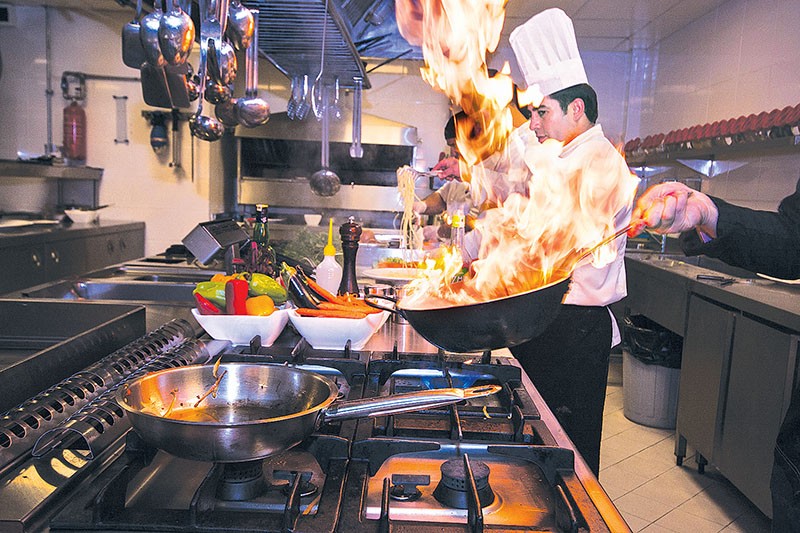Name: Mikhail Nosalyk
Position: Partner at Global Law
Key Point: Buyer beware
Did you know? He once had a case in which an unwashed bar glass lead to a Hepatitis outbreak
A bartender who doesn’t wash glasses, causing hepatitis to spread among customers.
A waiter who spills a scorching dish on a customer, causing severe burns.
An extortionist who poisons a restaurant’s soup, causing patrons to fall ill.
In Ukraine, perhaps more than other nations, people need to be careful about the restaurants, nightclubs and bars they frequent.
Not many people know more about the problems, perhaps, than Mikhail Nosalyk, a partner at Global Law. Nosalyk has encountered a lot of disturbing incidents in his practice, which involves constant work with governmental fire, food and consumer safety regulators.
Many of these problems take place in a loosely regulated environment.
New regulator
Ukraine has been trying to consolidate all of the agencies that run checks into one single regulator: the State Service of Ukraine for Food Safety and Consumer Regulation.
Although the body legally came into existence in February 2016, Nosalyk said that it’s still being formed. “They will be the main regulator,” Nosalyk said.
The new consumer protection agency, established by former Agriculture Minister Oleksiy Pavlenko, united the state inspection services for agricultural products, livestock, plants and quarantine issues.
But Nosalyk said that many “illegal verifications” continue. “There’s a list of state organs that have the right to conduct checks, but some will come who don’t have the right to come, or who have the right, but it’s the wrong administration to be conducting it.”
Many of the laws that government enforces date to the Soviet era.

Though Ukrainian food and health regulations are often quite strict, enforcement is piecemeal and the rules often self-contradictory, says Mikhail Nosalyk, a partner at Global Law who specializes in consumer protection issues. (Courtesy)
Ukraine still uses the 1970s Soviet labor code, while other requirements regulating the “adjacency of food products” mean that “storing products within our Soviet norms is impossible, because you need 40 refrigerators to keep everything.”
Part of the solution is to enact modern legislation.
One idea is replacing Ukraine’s 1970s labor code. Legislation has been kicking around the Verkhovna Rada, Ukraine’s parliament, since 2015. Labor lawyers expected action in the 2016 session, but that has not yet happened.
Clubbing
The cutthroat restaurant industry lends itself to attacks ranging from legal complaints to “titushki,” or hired thugs, coming over and breaking the windows of a competitor’s eating establishment.
Nosalyk told the story of a restaurant in Kyiv’s Pechersk district that was accused of playing music too loudly. But the people who filed the complaint were in Obolon, many kilometers away. “The police still tried to verify it,” Nosalyk said.
In another case that Nosalyk described as extortion, a man who was threatening a restaurant poisoned the establishment’s soup in a bid to exert pressure. “Everyone got poisoned,” he said.
Representing Kyiv’s nightclubs comes with its own set of legal challenges. Fights occasionally break out among patrons. So part of Nosalyk’s job is to review video footage to send to the police.
“We had a case where they just stole the camera,” Nosalyk said, adding that many club managers train video surveillance on their employees to prevent theft and not on revelers.
The lack of effective financial crime investigators makes it difficult to press theft charges against employees. “It’s difficult to prove,” Nosalyk said, adding that in one case, an employee was routinely saying he had given 10 percent discounts on items, but was actually pocketing the difference.
Comply or forfeit
But in general, government regulators still wield a heavy baton of civil forfeiture in cases where restaurants and clubs do not comply with the law.
Entrepreneurs in Ukraine have personal liability for their operations. A big fine could lead to the repossession of homes.
Nosalyk recounted the case of one bartender who was fined Hr 350,000 ($13,400) for ripping the excise label on a liquor bottle. “The bartender came, saw the fine, and said, ‘I don’t have the money, my salary is Hr 10,000 ($384),” Nosalyk recalled. “And then he left.”
Nosalyk’s advice: “It’s better to just do everything as it should be done, then you’ll sleep soundly.”
